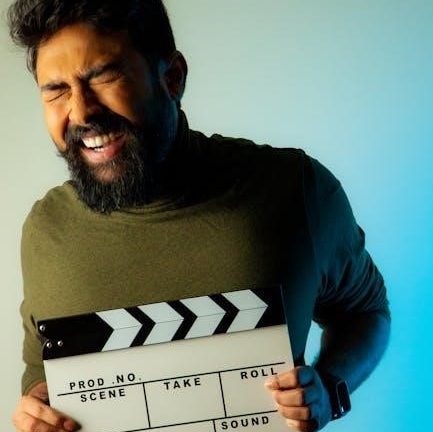The Holdovers screenplay, written by David Hemingson and directed by Alexander Payne, is a captivating comedy-drama set in a 1970s boarding school, exploring an unlikely friendship between a grumpy professor and a student, blending humor and emotional depth, while garnering an Oscar nomination for Best Original Screenplay and significant interest from film enthusiasts and aspiring writers.
Overview of the Screenplay
The Holdovers screenplay, penned by David Hemingson, is a character-driven comedy-drama directed by Alexander Payne; Set in a 1970s boarding school, it follows a cantankerous classics professor, played by Paul Giamatti, and his unlikely bond with a student. The script masterfully blends humor and emotional depth, exploring themes of isolation and redemption. With its sharp dialogue and rich character development, it has garnered critical acclaim and an Oscar nomination for Best Original Screenplay, making it a must-read for screenwriting enthusiasts and film lovers alike.
Historical Context of the Story
The Holdovers is set in the early 1970s, a period of social and cultural upheaval in America. The story unfolds in an all-male boarding school, offering a glimpse into a bygone era of traditional education and male-dominated environments. The screenplay captures the isolation and rigidity of such institutions, while also reflecting the broader societal shifts of the time. This historical backdrop provides a rich setting for exploring themes of human connection and resilience, making the narrative both timeless and deeply rooted in its era.

Production and Development
The Holdovers screenplay is currently in production with CAA Media Finance. Directed by Alexander Payne, it stars Paul Giamatti and DaVine Joy Randolph, blending comedy and drama.
Current Production Status
The Holdovers screenplay is currently in production under CAA Media Finance, with Alexander Payne directing. Starring Paul Giamatti and DaVine Joy Randolph, the film blends comedy and drama, set in a 1970s boarding school. The project marks Payne’s return to filmmaking after a six-year hiatus. Production is actively underway, with casting finalized and filming progressing. The screenplay’s Oscar nomination for Best Original Screenplay has heightened anticipation for its release.
Genius Behind the Screenplay
David Hemingson is the mastermind behind The Holdovers screenplay, crafting a compelling narrative that intertwines humor and pathos. Known for his nuanced character development and sharp dialogue, Hemingson’s work has received critical acclaim. His ability to create relatable characters and engaging storylines has made the screenplay a standout, earning an Oscar nomination for Best Original Screenplay. His writing style resonates with both audiences and critics, solidifying his reputation as a gifted screenwriter in Hollywood.
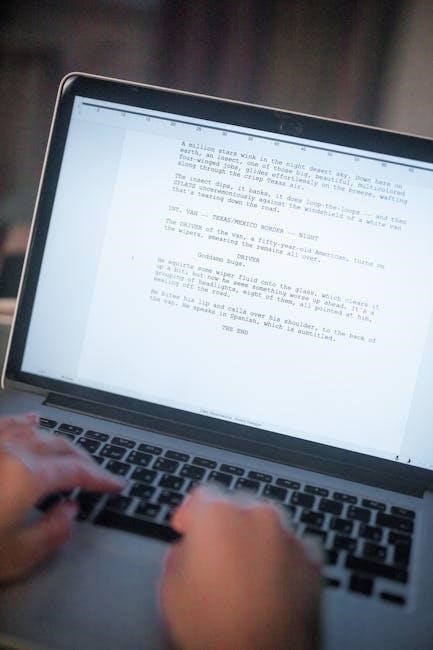
Plot Summary
The Holdovers follows a grumpy classics professor and a troubled student forming an unlikely bond at a 1970s boarding school, exploring themes of tradition, rebellion, and redemption, blending humor and emotional depth into a heartfelt journey of self-discovery and connection.
Setting and Time Period
The Holdovers is set in a traditional all-male boarding school during the early 1970s, a time of cultural shift and rebellion. The isolated, conservative environment clashes with the era’s evolving values, creating a tense yet nostalgic backdrop. The story unfolds in the confines of the school’s chapel, classrooms, and dormitories, emphasizing the characters’ confinement and their struggles with tradition. This setting amplifies the emotional and comedic dynamics, as the characters navigate personal growth amidst societal change.
Main Characters and Their Roles
Paul Giamatti stars as a surly classics professor, whose sharp wit and unconventional teaching methods clash with the school’s traditions. A rebellious student, entrusted to his care, challenges his rigid worldview, sparking an unlikely bond. Da’Vine Joy Randolph plays a charismatic love interest, adding warmth and depth to the professor’s isolated life. Michael Malvesti also appears in a pivotal role, contributing to the story’s emotional and comedic layers. These characters drive the narrative’s exploration of growth and connection in a rigid environment.

Themes and Tone
The Holdovers screenplay masterfully blends humor with heartfelt emotional depth, exploring themes of mentorship, growth, and tradition. Its witty dialogue and character-driven narrative create a nostalgic yet contemporary tone, resonating with both comedy and drama enthusiasts.
Humor and Pathos in the Story
The Holdovers screenplay skillfully intertwines humor and emotional depth, creating a rich narrative. The grumpy professor’s interactions with his student are both amusing and poignant, while the boarding school setting adds nostalgic charm. Witty dialogue and heartfelt moments balance perfectly, engaging audiences and making the story relatable and impactful.
Character Development and Dialogue
The Holdovers shines with well-crafted characters and sharp dialogue. Paul Giamatti’s surly professor and his student’s evolving relationship are central, showcasing growth and depth. Conversations feel natural, driving the plot and revealing character nuances. Hemingson’s script excels in creating relatable, flawed individuals, making the story both authentic and engaging. The dialogue’s wit and emotional resonance have been praised, enhancing the narrative’s impact and leaving a lasting impression on audiences and aspiring writers.

Screenplay Structure
The Holdovers screenplay, written by David Hemingson, is a tightly structured, 108-page script. Its character-driven narrative begins with a chapel scene, setting the tone for emotional depth and humor, while maintaining a balanced pace that engages readers and highlights its Oscar-nominated potential.
Length and Format
The Holdovers screenplay is a concise 108-page document, adhering to standard screenplay formatting. It begins with a clear title page, followed by scenes rich in dialogue and character development. The script is available in PDF format, accessible through platforms like Script Slug and Script Fly, offering aspiring writers a structured example of storytelling. Its length ensures a balanced narrative, making it a valuable resource for studying screenwriting techniques and pacing.
Opening Scene Analysis
The Holdovers screenplay opens on December 18, 1970, in a cold, formal chapel. Six boys, dressed in coats and ties, stand with hymnals, setting a somber tone. The scene introduces Paul Giamatti’s character, a gruff classics professor, and establishes the boarding school setting. This opening effectively sets the stage for the story, blending humor with underlying tension, and introduces the central character’s complexities. It captures the essence of the film’s tone and narrative focus, drawing viewers into the world of 1970s academia.
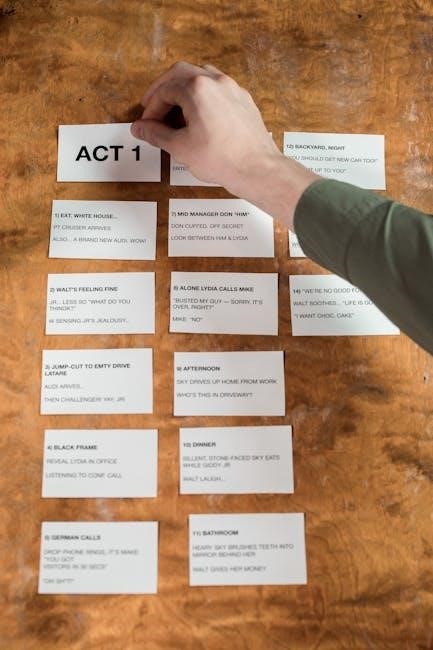
Controversies
The Holdovers screenplay faced plagiarism accusations, with claims that it borrowed elements from an unproduced script titled Frisco. This controversy emerged just before the Oscars.
Plagiarism Accusations
The Holdovers screenplay faced allegations of plagiarism, with claims that it borrowed elements from an unproduced script titled Frisco; This controversy arose just before the film’s Oscar nomination, sparking debates in the industry. Despite these accusations, the screenplay maintained its recognition, including its Oscar nomination for Best Original Screenplay. The story, set in a 1970s boarding school, revolves around a professor and a student, blending humor and emotional depth, which contributed to its enduring appeal amidst the plagiarism debate.
Industry Reactions and debates
The Holdovers screenplay has sparked significant industry debate, particularly following its Oscar nomination for Best Original Screenplay. While many praised its originality and character-driven storytelling, plagiarism accusations surfaced, with claims that it borrowed elements from an unproduced script. This controversy fueled discussions about creativity and ethics in screenwriting. Despite the backlash, the screenplay remains a celebrated work, with filmmakers and writers analyzing its structure and dialogue, solidifying its place as a talked-about piece in Hollywood circles.

Awards and Recognition
The Holdovers screenplay earned an Oscar nomination for Best Original Screenplay, highlighting its critical acclaim and impact in the film industry, further solidifying its reputation as a standout work.
Oscar Nomination for Best Original Screenplay
The Holdovers screenplay, written by David Hemingson, received an Oscar nomination for Best Original Screenplay, marking a milestone in its acclaim. Directed by Alexander Payne, the film stars Paul Giamatti and explores themes of friendship and growth in a 1970s boarding school. The nomination highlights the screenplay’s nuanced storytelling, rich character development, and sharp dialogue, which resonated with audiences and critics alike, solidifying its place as a standout in contemporary cinema. Its recognition underscores the impact of its compelling narrative and emotional depth.
Critical Acclaim and Reviews
The Holdovers screenplay has garnered widespread critical acclaim for its masterful blend of humor and emotional depth. Reviewers praise its sharp dialogue and well-crafted characters, highlighting the script’s ability to balance comedy with poignant moments. The story’s relatability and nuanced character development have resonated with audiences, making it a standout in contemporary cinema. Aspiring writers and film enthusiasts are particularly drawn to its structured format and insightful storytelling, offering valuable lessons in screenwriting and emotional resonance.
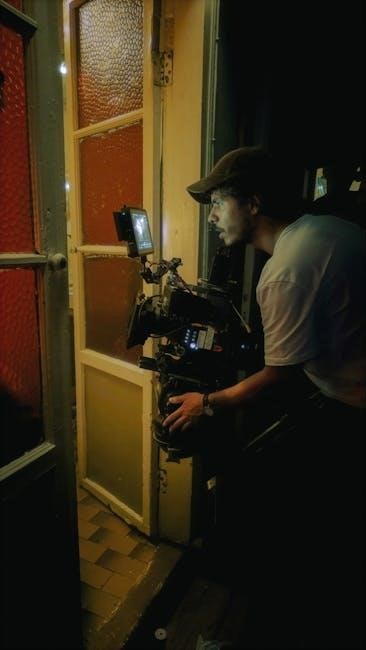
Downloading the Screenplay
The Holdovers screenplay is available for download in PDF format from sources like Script Slug, Script Fly, and Script City, offering multiple drafts for enthusiasts.
Legitimate Sources for PDF Download
Film enthusiasts can access The Holdovers screenplay PDF through reputable platforms like Script Slug, Script Fly, and Script City. These websites offer free downloads, with multiple drafts available, including the 5/6/2021 version. Additionally, scrapsfromtheloft.com provides a transcript for those seeking alternative access. Users are encouraged to explore these sources, as they ensure legal and ethical access to the script. Be sure to check for updated links, as availability may change over time.
Importance of Legal and Ethical Downloads
Downloading The Holdovers screenplay PDF from legitimate sources ensures compliance with copyright laws and supports creators. Illegal downloads undermine the film industry and deprive writers of rightful recognition; Accessing scripts legally promotes ethical practices and respects the hard work of screenwriters like David Hemingson. By choosing authorized platforms, fans and aspiring writers contribute to the sustainability of artistic projects and uphold the value of original content. Always prioritize legal downloads to avoid legal consequences and support the creative community.

Related Scripts and Films
The Holdovers shares themes with films like Swingers, Bridget Jones Diary, and Shakespeare in Love, offering similar character-driven narratives and emotional depth, making them great recommendations for fans.
Similar Films and Scripts
The Holdovers draws comparisons to films like Swingers, Bridget Jones Diary, and Shakespeare in Love, which also blend humor with heartfelt storytelling. These scripts and films share themes of personal growth, unexpected relationships, and emotional depth, resonating with audiences seeking character-driven narratives. They also explore societal dynamics, much like The Holdovers, making them great references for fans of the screenplay. These works offer valuable insights into crafting compelling dialogue and nuanced character development.
Comparisons with Other Notable Films
The Holdovers is often likened to films such as Swingers and A Serious Man, which share its blend of humor and emotional depth. Like Shakespeare in Love and 20th Century Women, it explores complex relationships and societal dynamics. The screenplay’s character-driven approach and witty dialogue evoke comparisons to Bridget Jones’s Diary, making it a standout in the comedy-drama genre. These parallels highlight its universal appeal and nuanced storytelling, drawing audiences to its relatable and engaging narrative.
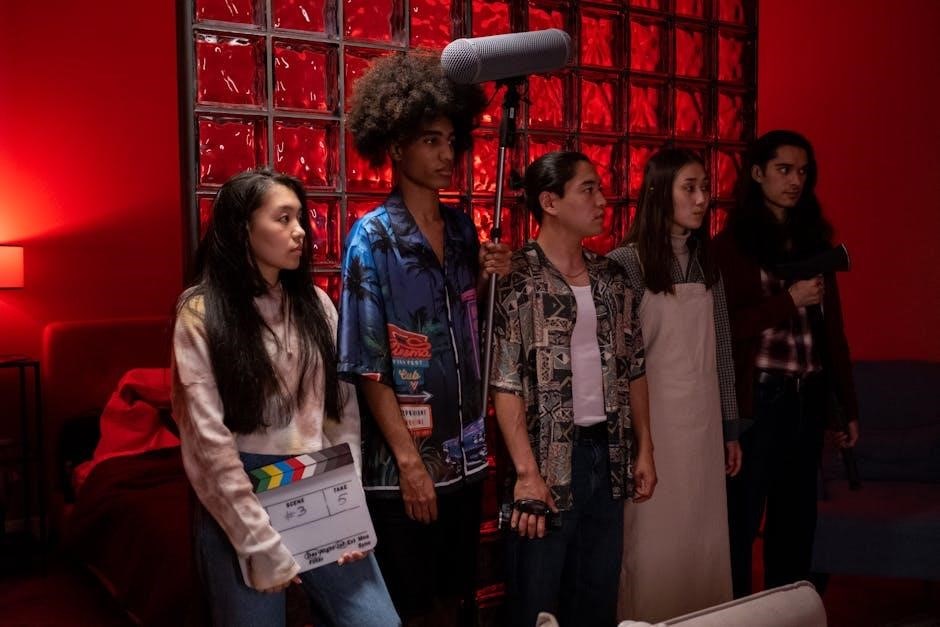
Educational Value
The Holdovers screenplay is a valuable resource for screenwriting students, offering insights into dialogue, character development, and storytelling structure, making it a practical tool for learning screenwriting skills.
Learning Screenwriting from the Script
The Holdovers screenplay is a masterclass in screenwriting, offering insights into crafting compelling dialogue, complex characters, and emotional depth. Its Oscar-nominated status highlights its value as a learning tool for aspiring writers, showcasing how humor and pathos can seamlessly coexist. Students can study its structure, pacing, and character arcs to understand effective storytelling techniques. The script’s ability to balance comedy and drama provides a rich framework for analyzing tone and narrative balance, making it a valuable educational resource for screenwriting enthusiasts.
Analysis for Aspiring Writers
The Holdovers screenplay serves as a compelling study for writers, showcasing how to craft relatable characters and balance humor with emotional storytelling. Its dialogue-driven narrative highlights the importance of voice and authenticity, while the script’s pacing demonstrates effective scene structure. Aspiring writers can analyze how the story navigates complex themes, such as isolation and redemption, through subtle character interactions. The screenplay’s Oscar nomination underscores its merit as a model for achieving both critical acclaim and audience connection, offering invaluable lessons in storytelling craft.
The Holdovers screenplay stands as a masterful blend of humor and emotional depth, offering a timeless story while sparking industry discussions and inspiring aspiring writers with its craft.
Final Thoughts on the Screenplay
The Holdovers screenplay is a testament to masterful storytelling, blending humor and pathos seamlessly. Its nuanced character development and sharp dialogue have captivated both critics and audiences, making it a standout piece in contemporary cinema. The script’s ability to balance light-hearted moments with profound emotional depth showcases the skill of its writer, David Hemingson. Aspiring writers can learn much from its structure and execution, solidifying its place as a study-worthy piece in the realm of screenwriting.
Future Prospects and Impact
The Holdovers screenplay is poised to leave a lasting impact on the film industry, with its Oscar buzz enhancing its reputation as a compelling character-driven story. Its nuanced dialogue and emotional depth make it a valuable study piece for aspiring writers. The script’s availability on platforms like Script Slug and Script Fly ensures its reach among enthusiasts. While plagiarism accusations may taint its legacy, its influence on future character-driven films remains undeniable, solidifying its place in cinematic and educational realms.
Frequently Asked Questions
Common Queries About the Screenplay
- Who wrote the screenplay for The Holdovers?
David Hemingson penned the screenplay for The Holdovers, a comedy-drama directed by Alexander Payne, featuring Paul Giamatti as a grumpy professor in a 1970s boarding school.
- Who is the director of The Holdovers?
Alexander Payne directed The Holdovers, marking his return to filmmaking after a six-year hiatus, bringing his signature style to this character-driven story.
- What is the setting and time period of the screenplay?
The Holdovers is set in a 1970s all-male boarding school, exploring the relationship between a professor and a student over a holiday break.
- Where can I download the Holdovers screenplay PDF?
The screenplay is available for download on platforms like Script Slug, Script Fly, and Script City, with multiple drafts accessible to enthusiasts and writers.
- Is The Holdovers nominated for any awards?
Yes, The Holdovers received an Oscar nomination for Best Original Screenplay, highlighting its critical acclaim and impact in the film industry.
- What are the main themes of The Holdovers?
The screenplay explores themes of friendship, redemption, and personal growth, blending humor with emotional depth in its narrative.
- Who stars in The Holdovers?
Paul Giamatti stars as the grumpy classics professor, alongside DaVine Joy Randolph and Michael Malvesti, bringing the story’s characters to life.
- Has The Holdovers been accused of plagiarism?
Yes, The Holdovers faced plagiarism accusations, with claims that it bears similarities to an unproduced script, adding controversy to its release.
- Is The Holdovers suitable for educational purposes?
Yes, the screenplay is highly regarded for its educational value, offering insights into character development, dialogue, and storytelling structure for aspiring writers.
- How long is The Holdovers screenplay?
The screenplay is 108 pages long, providing a detailed and engaging narrative that captures the essence of its characters and setting.
Frequent questions about The Holdovers screenplay include its availability, Oscar nomination, and plagiarism accusations. The script, written by David Hemingson, is downloadable from sites like Script Slug and Script Fly. Directed by Alexander Payne, it stars Paul Giamatti as a grumpy professor. The story, set in a 1970s boarding school, blends humor and emotional depth. Despite its acclaim, plagiarism claims have sparked debates. Fans and writers seek it for its educational value in character development and dialogue.
Clarifications and Additional Information
The Holdovers screenplay, written by David Hemingson, is available for download from reputable sites like Script Slug, Script Fly, and Script City, with multiple drafts accessible. Directed by Alexander Payne, the film stars Paul Giamatti and explores themes of friendship and redemption in a 1970s boarding school. While it received an Oscar nomination, plagiarism accusations have arisen, sparking industry debates. Fans and writers are drawn to its nuanced character development and dialogue, making it a valuable resource for learning screenwriting techniques and storytelling.
